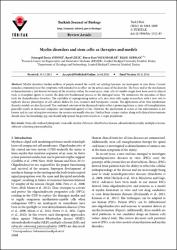| dc.contributor.author | Aydınlı, Fatmagül İlayda | |
| dc.contributor.author | Çelik, Eşref | |
| dc.contributor.author | Kurt Vatandaşlar, Burcu | |
| dc.contributor.author | Kerman, Bilal Ersen | |
| dc.date.accessioned | 08.07.201910:49:13 | |
| dc.date.accessioned | 2019-07-08T20:18:47Z | |
| dc.date.available | 08.07.201910:49:13 | |
| dc.date.available | 2019-07-08T20:18:47Z | |
| dc.date.issued | 2016 | en_US |
| dc.identifier.citation | Aydınlı, F. İ., Çelik, E., Kurt Vatandaşlar, B. ve Kerman, B. E. (2016). Myelin disorders and stem cells: As therapies and models. Turkish Journal of Biology, 40(5), 1068-1080. https://dx.doi.org/10.3906/biy-1512-83 | en_US |
| dc.identifier.issn | 1300-0152 | |
| dc.identifier.uri | https://hdl.handle.net/20.500.12511/479 | |
| dc.identifier.uri | https://dx.doi.org/10.3906/biy-1512-83 | |
| dc.description.abstract | Myelin disorders burden millions of people around the world, yet existing therapies are inadequate to cure them. Current remedies commonly treat the symptoms with minimal to no effect on the actual cause of the disorder. The basis and/or the mechanism of demyelination is not known for many of the disorders either. In recent years, stem cells of variable origin have been used in clinical trials as transplant agents to restore the defective biochemical process or the damaged tissue. We summarize the outcomes of these trials for demyelination disorders. The capability of reprograming mature cells into stem cells equips researchers with a new tool to replicate disease phenotypes in cell culture dishes for basic research and therapeutic screens. The applications of in vitro myelination disorder models are also discussed. The combined outcome of the discussed studies offers a promising future as stem cell transplantation generally results in decreased symptoms and improved quality of life. However, the mechanism of action of the interventions is not known and in cases of negative outcomes the reasons are usually obscure. Further basic science studies along with clinical interventions should close the knowledge gap and should help spread the positive results to a larger population. | en_US |
| dc.language.iso | eng | en_US |
| dc.publisher | Tubitak Scientific & Technical Research Council | en_US |
| dc.rights | info:eu-repo/semantics/openAccess | en_US |
| dc.subject | Stem Cells | en_US |
| dc.subject | Induced Pluripotent Stem Cells | en_US |
| dc.subject | Myelin | en_US |
| dc.subject | Pelizaeus–Merzbacher Disease | en_US |
| dc.subject | Adrenoleukodystrophy | en_US |
| dc.subject | Multiple Sclerosis | en_US |
| dc.subject | Subacute Sclerosing Panencephalitis | en_US |
| dc.title | Myelin disorders and stem cells: As therapies and models | en_US |
| dc.type | review | en_US |
| dc.relation.ispartof | Turkish Journal of Biology | en_US |
| dc.department | İstanbul Medipol Üniversitesi, Rektörlük, Rejeneratif ve Restoratif Tıp Araştırmaları Merkezi (REMER) | en_US |
| dc.department | İstanbul Medipol Üniversitesi, Tıp Fakültesi, Temel Tıp Bilimleri Bölümü, Histoloji ve Embriyoloji Ana Bilim Dalı | en_US |
| dc.authorid | 0000-0003-1106-3288 | en_US |
| dc.identifier.volume | 40 | en_US |
| dc.identifier.issue | 5 | en_US |
| dc.identifier.startpage | 1068 | en_US |
| dc.identifier.endpage | 1080 | en_US |
| dc.relation.publicationcategory | Makale - Uluslararası Hakemli Dergi - Kurum Öğretim Elemanı | en_US |
| dc.identifier.wosquality | Q3 | en_US |
| dc.identifier.scopusquality | Q2 | en_US |


















